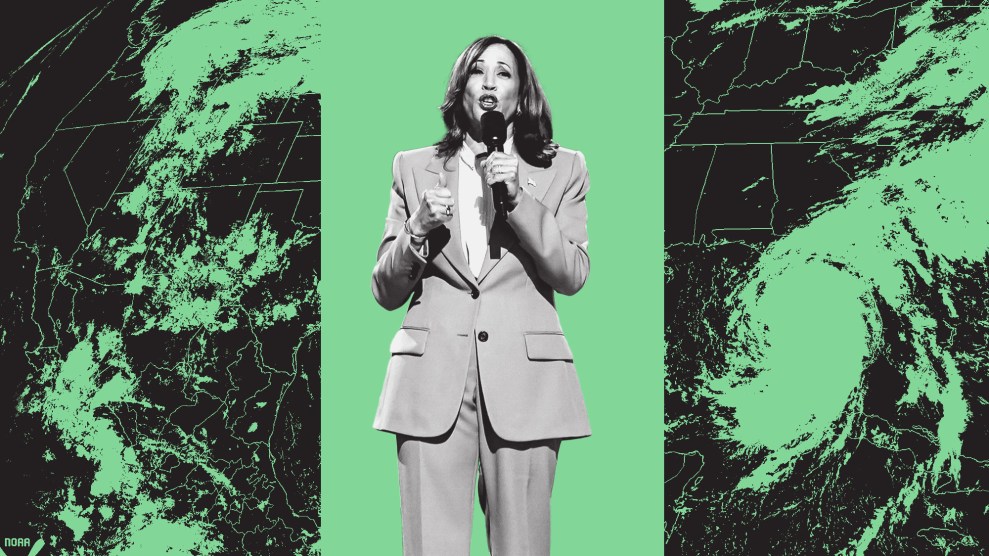
Mother Jones illustration; Nathan Howard/Sipa/AP, NOAA/AP
In a personal, wide-ranging speech to close out the Democratic National Convention in Chicago on Thursday night, Vice President Kamala Harris briefly touched on climate change, but largely avoided the topic.
Many “fundamental freedoms are at stake” in this election, Harris said, including the “freedom to breathe clean air and drink clean water and live free from the pollution that fuels the climate crisis.” That was it.
For an issue that scientists warn is a major, global threat to our species and thousands of others, you’d think it’d get a little more airtime.
For an issue that scientists warn is a major, global threat to our species, you’d think it’d get a little more airtime.
To be sure, over the four-day convention, climate change had a few, brief moments in the spotlight: In his opening night speech, President Joe Biden highlighted his climate record, including signing into law the Inflation Reduction Act, which he described as “the most significant climate law in the history of mankind,” and launching the Climate Corps, a climate jobs program which he compared to similar programs like the Peace Corps. On Thursday, Interior Secretary Deb Haaland made the case for Harris, saying she and vice presidential nominee Tim Walz would “fight for a future where we all have clean air, clean water and healthy communities.” In an impassioned, short speech, Florida Rep. Maxwell Frost, the youngest member of Congress, said that “fighting the climate crisis is patriotic.” (Watch our interview with Frost here.) And throughout the week, trainings, council meetings, and panels centered on climate.
But in some of the event’s biggest speeches, including Harris’, climate change was absent or scantly mentioned. Walz, who spoke on Wednesday night, made almost no mention of environmental issues during his 15-minute speech. Even as he listed his achievements as Minnesota’s governor, including paid family and medical leave and free meals in schools, he left out any climate-related wins, like signing a law last year requiring his state to reach 100 percent renewable-fueled electricity by 2040. Now, as a science journalist, I might be biased, but that’s a pretty major item for Walz to leave out of the biggest speech of his career so far.
Some environmental advocates took notice of the lack of climate talk at the convention. “It’s a bit of a bummer that it hasn’t gotten more time,” Cassidy DiPaola, spokesperson for the Make Polluters Pay Campaign, a climate accountability organization, told the Guardian ahead of Thursday’s programming.
But others seem less bothered by climate’s absence at the convention—or on the campaign trail. Although Democrats’ climate goals feature prominently in the party’s official platform, approved this week at the DNC, Harris has yet to release a detailed plan for fighting the crisis. “I am not concerned,” Washington’s Democratic governor Jay Inslee, a vocal climate advocate, told the New York Times, saying his bigger concern is electing Harris to office. “I am totally confident that when she is in a position to effect positive change, she will.”
“This is an issue where it’s absolutely stark.”
Despite its absence in Harris’ campaign, Democratic organizers say they see climate as an issue she can win on. Polling shared at the DNC this week by Data for Progress, a progressive think tank, revealed that a majority of voters are at least somewhat familiar with climate change and environmental justice. And for about a third of voters polled, climate change was more important to them this year than in 2020. “It’s become an absolutely kitchen table issue,” Michelle Deatrick, chair of the DNC’s climate council told me. “People are very aware of it and concerned.” Particularly in contrast to former President Donald Trump, she says, who has referred to climate change as a “hoax” and rolled back more than 100 environmental protections, Democrats, she believes, have a winning case. “This is an issue where it’s absolutely stark,” she says.
The trouble is, many Americans aren’t aware of either Biden’s or Harris’ climate record. As Grist reported earlier this month, shortly ahead of the Inflation Reduction Act’s second anniversary, polling suggests as many as four in 10 voters have heard “nothing at all” about Biden’s signature climate law, for which Harris cast the tie-breaking vote in the Senate. Deatrick sees this gap in knowledge as an “opportunity” for Democrats to get the word out about the Biden-Harris administration’s “huge wins”—from investments in electric vehicle infrastructure to lead pipe removal and land protections. “That is the work that is being done and needs to be done,” she said.
By all accounts, Harris has a part in the most climate-active administration in American history. So, if she wants more voters to understand her record, it might help to start talking about it.
















